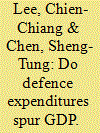| Srl | Item |
| 1 |
ID:
076957


|
|
|
|
|
| Publication |
2007.
|
| Summary/Abstract |
This paper empirically re-examines the long-run co-movements and the causal relationships between GDP and defence expenditures in a multivariate model with real defence expenditure per capita (ME), real GDP per capita (GDP), and real capital stock per capita (K). We apply the view of the aggregate production function to construct the empirical model. Using up-to-date data for 27 OECD countries and 62 non-OECD countries for the 1988-2003 period, we combine cross-sectional and time series data to re-investigate the relationship between GDP and ME. Previous studies using time series data may have yielded misleading results on account of the short time span of typical datasets. By contrast, we use recently developed panel unit root tests and heterogeneous panel cointegration tests, and conclude that there is fairly strong evidence in favour of the hypothesis of a long-run equilibrium relationship between GDP and ME. The long-run panel regression parameter results, such as the fully modified OLS, indicate that a positive relationship between GDP and ME only holds for OECD countries, whereas a negative relationship from ME to GDP only exists in non-OECD countries under examination and in the panel as a whole. Furthermore, by implementing the dynamic panel-based error correction model, we determine that GDP and ME lack short-run causalities, but do show long-run bidirectional causalities in both OECD and non-OECD countries
|
|
|
|
|
|
|
|
|
|
|
|
|
|
|
|
| 2 |
ID:
140832


|
|
|
|
|
| Summary/Abstract |
There has been a distinct trend of military service system change from conscription to enlistment around the world. This study aims to investigate how this change affects the demand for military expenditure. Our model is based on neoclassical model. Empirically, a two-break unit root test is applied to test the endogeneity of structural changes along with the system change. Then, an autoregressive distributed lag model is used to examine the effects on military expenditure. The empirical results show that the demand for military expenditure partly coincides with the system change. The effect of GDP on military expenditure is larger in countries with conscription than in those with enlistment.
|
|
|
|
|
|
|
|
|
|
|
|
|
|
|
|
| 3 |
ID:
112307


|
|
|
|
|
| Publication |
2012.
|
| Summary/Abstract |
The causal relationships between energy consumption and economic growth have given rise to much discussion but remain controversial. Alternative data sets based on different time spans, countries, energy policies and econometric approaches result in diverse outcomes. A meta analysis using a multinomial logit model with 174 samples governing the relationships between GDP and energy consumption is applied here to investigate the major factors that affect these controversial outcomes. The empirical results have demonstrated how the time spans, subject selections including GDP and energy consumption, econometric models, and tools for greenhouse gases emission reduction characteristics significantly affect these controversial outcomes.
|
|
|
|
|
|
|
|
|
|
|
|
|
|
|
|